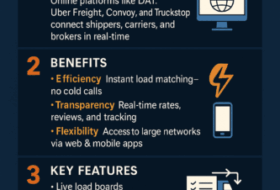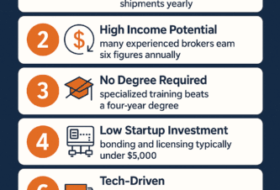Learn how to become a freight broker with our comprehensive online course.
Are you interested in starting a career as a freight broker? Do you want to learn the skills and knowledge required to become a successful freight broker? If so, you’ve come to the right place. In this article, we’ll provide you with a comprehensive guide on how to become a freight broker, including the steps you need to take and the importance of a freight broker course.
Introduction
Before we dive into the details of becoming a freight broker, let’s start with the basics. A freight broker is a professional who acts as an intermediary between shippers and carriers. Their primary responsibility is to match shippers with carriers who can transport their goods efficiently and cost-effectively. Freight brokers play a vital role in the transportation industry, and they can earn a lucrative income while enjoying a flexible schedule.
Understanding the role of a freight broker
To become a successful freight broker, you must understand the role of a freight broker and the skills required to perform the job effectively. A freight broker is responsible for managing the transportation of goods from the shipper to the carrier. They negotiate rates, ensure compliance with regulations, and handle all the necessary paperwork. To be a successful freight broker, you must have excellent communication and negotiation skills, be detail-oriented, and possess the ability to multitask.
Steps to becoming a freight broker
Now that you understand the role of a freight broker let’s dive into the steps you need to take to become one.
Registering for a freight broker authority
The first step to becoming a freight broker is to register for a freight broker authority with the Federal Motor Carrier Safety Administration (FMCSA). This process involves completing an online application, paying a fee, and submitting proof of insurance.
Obtaining a surety bond
After obtaining a freight broker authority, you must obtain a surety bond. A surety bond is a form of insurance that protects shippers and carriers from financial losses due to your actions as a freight broker.
Applying for a license and insurance
Next, you’ll need to apply for a license and insurance. This step involves obtaining liability and cargo insurance and registering your business entity.
Understanding the FMCSA regulations
As a freight broker, you must comply with the regulations set forth by the FMCSA. This includes understanding the hours of service regulations, driver qualification requirements, and safety regulations.
Building a network of shippers and carriers
To succeed as a freight broker, you must build a network of shippers and carriers. This involves reaching out to potential clients and building strong relationships with them. You must also establish connections with reliable carriers who can transport the goods efficiently and cost-effectively.
Importance of a freight broker course
While it’s possible to become a freight broker by following the steps mentioned above, enrolling in a comprehensive freight broker course can make the process easier and more efficient. A freight broker course can provide you with the knowledge and skills required to excel in the field.
Advantages of a freight broker course
A freight broker course can provide you with a comprehensive understanding of the transportation industry and the role of a freight broker. You’ll learn about the regulations and requirements, negotiation and communication skills, and the business aspects of being a freight broker.
Types of freight broker courses
There are several types of freight broker courses available, including online courses, in-person courses, and hybrid courses. Online courses are convenient and flexible, while in-person courses provide more hands-on training. Hybrid courses combine both online and in-person training.
Key features of a comprehensive freight broker course
A comprehensive freight broker course should cover all the essential topics, including the FMCSA regulations, negotiation and communication skills, and the business aspects of being a freight broker. The course should also provide hands-on training and support, including access to industry professionals and resources.
Choosing the right freight broker course
Choosing the right freight broker course is crucial to your success as a freight broker. Here are some factors to consider when selecting a freight broker course:
Factors to consider when choosing a freight broker course
Accreditation: Ensure that the course is accredited and recognized by industry professionals.
Reputation: Check the course provider’s reputation and reviews from past students.
Course content: Review the course content and ensure that it covers all the essential topics.
Cost: Consider the cost of the course and whether it’s within your budget.
Top-rated freight broker courses
There are several top-rated freight broker courses available, including the Freight Broker Training Institute, Load Training, and the Brooke Transportation Training Solutions.
Tips for succeeding as a freight broker
Finally, here are some tips for succeeding as a freight broker:
Develop strong relationships with shippers and carriers
Building strong relationships with shippers and carriers is crucial to your success as a freight broker. Communicate effectively, negotiate fairly, and always follow through on your promises.
Continuously improve your knowledge and skills
The transportation industry is constantly evolving, so it’s essential to stay up-to-date with the latest regulations and trends. Attend industry conferences, read industry publications, and enroll in additional training courses.
Market yourself effectively
Effective marketing is essential to building a successful freight brokerage business. Develop a strong brand identity, establish a professional website and social media presence, and network with industry professionals.
Becoming a freight broker can be a lucrative and rewarding career path. By following the steps outlined in this article and enrolling in a comprehensive freight broker course, you can acquire the knowledge and skills required to succeed in the industry.
FAQs
What is a freight broker?
A freight broker is a professional who acts as an intermediary between shippers and carriers. Their primary responsibility is to match shippers with carriers who can transport their goods efficiently and cost-effectively.
How do I become a freight broker?
To become a freight broker, you must register for a freight broker authority, obtain a surety bond, apply for a license and insurance, understand the FMCSA regulations, and build a network of shippers and carriers.
What are the benefits of being a freight broker?
Freight brokers can earn a lucrative income while enjoying a flexible schedule. They also play a vital role in the transportation industry and have the opportunity.








